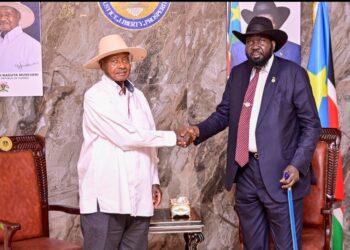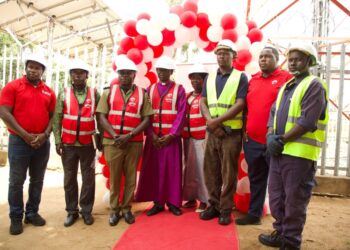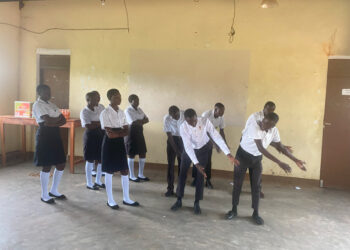For a very long time now, media and security organs in Uganda have been in an on and off relationship especially in times of elections. Security personnel have always beaten up journalists with no clear explanations as to why they are battered.
Although article 29 of the 1995 constitution of Uganda gives journalists’ rights to operate like any other professionals in Uganda, security operatives have continued to mistreat them.
Several journalists have been inhumanly beaten by security forces whereby some of them made it out with permanent injuries. Among them is Andrew Lwanga who is incapacitated with a spinal injury which he sustained in 2015. The injury was metted on him by the former Old Kampala Police Post Commander Joram Mwesigye.
In 2018, NTV’s Herbert Zziwa, together with others were arrested as they tried to report live from the northern town of Arua, where Bobi Wine’s driver Yasin Kawuma was killed during a bitterly contested by-election, which was won by Kassiano Wadri.
On 20th Agust 2018, Reuters photojournalist James Akena was beaten by military soldiers. Despite being on his knees, with his arms raised, soldiers went on to brutalize him. Later forces blamed Akana for acting unprofessional. Akena was one of the journalists that were covering the demonstrations which were calling for the release of Robert Kyagulanyi aka Bobi Wine.
On the same day, the weekly Observer reporter and photographer, Alfred Ochwo, and two NTV colleagues, Ronald Galiwango and Juma Kirya, were also badly beaten by soldiers. Several journalists on that day alluded that on that day soldiers forced them to delete content from their cameras and smartphones.
In these ongoing general elections, journalists were a month back assaulted by the police and the army, however, no apology was made by the joint security forces of Uganda.
On some of the instances, editors and media owners have always engaged with the security forces but the terms have automatically failed to work. And on several occasions, journalists have threaten to boycott state functions over security forces brutality but they have always yielded no fruit.
However, on Monday, a strong step was made as journalists when they walked away in protest from a press conference which was organised by security officials at Uganda Media Centre.
This step was to express their total dissatisfaction in the way security forces in Uganda handle media practitioners. And the words of Uganda Peoples Defence Force (UPDF) Chief Political Commissar Maj. Gen. Henry Matsiko’s worked as the last catalyst that prompted journalists to leave the press conference angry.
“You can’t have a State that is a threat to its citizens, and our position is clear. The State is there to mitigate internal and external threats. It gets hard when these are being implemented.If you mingle with a very volatile situation, it may be difficult to isolate the actors who are on the wrong side. Once you are a journalist, prove to us that you are exercising journalism. Professionalism will help all of us,” Gen Matsiko told journalists.
In response, Buule Gabriel, a journalist working with Daily Monitor said, “For us, we wanted just an apology for their inhuman actions on the journalists but the General was telling us to see the good things NRM has done. They have beaten our colleagues and what they do is to call us hooligans, rumour mongers. There was no crime we made to become journalists so until they apologize we shall not cover them. it’s our call that any TV station or radio that plays their content, Ugandans should boycott it, this is a war against brutality by the security forces on Ugandans,” he said.
On several occasion, security officers have accused victim journalists of acting unprofessional.
“Journalists on these campaign trails at times act like activists, they should either decide and turn into the activism or journalism,” Police spokesperson Fred Enanga said recently while reacting on why Police officers in Luuka district pepper sprayed Ghetto TV journalist Ashraf Kasirye .
According to Makerere University researcher Yusuf Sserunkuma, journalists must also protest to their employers too for their safety.
“In these struggles of the weak, you can only cause impact when capital and profits are disrupted. The owners of the money have to see a slump in their profits to join you in the struggle for a safe working environment. Your bosses – media owners and editors – have to join the struggle against the persecution of journalists and have to be at the forefront. You are not only poorly paid, but just a few of you (mostly, ironically editors and owners) have insurance cover for life-threatening medical injuries.
“Before Aga Khan, Linus Githai, Maria Kiwanuka, Francis Bbabu, Andrew Mwenda, Sam Gummah, Robert Kabushenga, Charles Peter Mayiga, Aga Sekalala Jnr, William Pike, Peter Ssematimba, Kin Karissa add their bodies/voices to the plight of journalists, there is no end in sight. These fellows have the most money, have influence, and have all the connection. They must be on the streets with you,” Sserunkuma said.
Do you have a story in your community or an opinion to share with us: Email us at editorial@watchdoguganda.com













